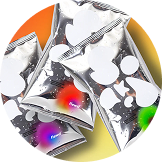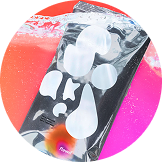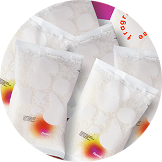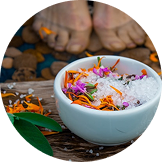Waking up feeling exhausted, no matter how much sleep you get? Struggling to focus or recall simple details even after your second cup of coffee? Constantly dealing with poor recovery from exercise, or feeling “run down” all the time? It could be chronic fatigue syndrome (CFS).
This condition is much more than just being tired. It’s also known as Myalgic Encephalomyelitis, and takes a serious toll on your physical and mental well-being. Even the most menial of tasks can start to feel impossible.
While it may end up requiring professional treatment, it’s worth starting with chronic fatigue syndrome self-care. We’re going to share strategies you can try to reduce flare-ups and protect limited energy.
One of our personal favorite ways to manage CFS is with our fatigue defeating bath soak. It combines the most bioavailable magnesium chloride with amino acid tryptophan and potassium. These work together to beat mind fog, restore restful nights, and help you catch more energy.
Join over 100,000 happy customers and counting who have made a magnesium bath soak from Flewd Stresscare a part of their regular self-care ritual. Once you feel the difference these can make in your life, you’ll never go without them!
“What my tired body needs! I love these. I'm a solo mama and these have been a lifesaver for tending in short bursts of time.” - Elyza
“I'm perimenopause, so naturally I'm exhausted, stressed and usually carry a lot of tension. I've been using these soaks for about 3 weeks and my massage therapist who I see every other week noticed a significant different in the tension in my neck and upper back! I've noticed a difference in my overall mood as well. I love these products and recommend them highly!” - Corin
“I have been using FLEWD a few times a week for 3 months now. I am noticing that I am feeling lighter, less stressed, less easily frustrated and annoyed. My mood is better, and my ability to handle stressful situations is increasing. I just feel better.” - Carrie
Overview of Chronic Fatigue Syndrome (CFS)
This is a really complex condition. A lot of people struggling with it just chalk it up to being really tired. But as we explain in our fatigue vs tired comparison, it’s far deeper than that.
This is the kind of exhaustion that hijacks your ability to function physically, mentally, and emotionally. It gets worse after any effort, even something as basic as brushing your teeth or taking a short walk. It feels confusing and frustrating - but understanding it is the first step.
Common Symptoms That Go Beyond Just Feeling Tired
The hallmark symptom of CFS is post-exertional malaise (PEM). This is an energy crash that occurs after even minimal activity. Think of it as workout soreness or mental exhaustion, but amplified tenfold.
- PEM can cause something as simple as folding laundry to trigger a symptom spiral that lasts for days. Other common symptoms of CFS include:
- Unrefreshing sleep, where no amount of rest seems to restore energy.
- Cognitive issues, or “brain fog.” It’s hard to focus, recall words, or follow conversations.
- Muscle and joint pain, sometimes without obvious inflammation.
- Dizziness or lightheadedness, especially when standing up, due to issues with blood pressure or circulation.
- Hypersensitivity to light, sound, or smell can drive you crazy.
It’s normal to experience fluctuating symptoms, where some days feel manageable, and others feel like starting over. But, the core experience is always one of running on empty, no matter how much you try to rest or “push through.”
What Triggers or Contributes to CFS?
There’s no single known cause of Chronic Fatigue Syndrome. Researchers’ best bet is it’s a combination of stressors layered on top of each other. Common contributors include:
- Viral infections, such as Epstein-Barr virus or long COVID.
- Immune system dysregulation, where the body is stuck in a low-level state of inflammation.
- Hormonal imbalances involving the HPA axis (the system that controls stress hormones like cortisol).
- Nervous system dysregulation, which affects how the brain processes fatigue, pain, and sleep.
Add in ongoing physical or emotional stress, and the body may lose its ability to bounce back the way it used to. While it’s probably worth talking to an expert, it doesn’t hurt to start with chronic fatigue syndrome self-care from the comfort of your own home.
Chronic Fatigue Syndrome Self-Care Checklist
Self-care for chronic fatigue syndrome sounds like “treating yourself.” But it’s actually more than that. It involves strategies and lifestyle shifts to protect your very limited energy, manage symptoms, and help your body function without crashing.
We want to be clear in saying that there’s no magic bullet for treating CFS, but building a routine around these strategies can lead to small wins that continue stacking up over time.
Prioritize Pacing Over Pushing
Forget the grind. People with CFS know all too well how pushing through can backfire, leading to PEM and then derailing your next few days. Instead, you need to learn how to pace yourself in everything you do.
That means balancing activity and rest in a way that prevents overexertion before it happens. This way, you’re not left to pick up the pieces after you overdo it.
We recommend starting with the “energy envelope” method: only spend what you have, not what you wish you had. Break tasks into smaller chunks, take frequent breaks, and use timers or reminders to help you stop before you hit a wall.
You may feel unproductive at first, but it’s sustainable. That’s what matters most.
Create a Restful Routine That’s Actually Restorative
Rest is great - but it’s a pretty vague thing. Not all rest is created equal. Binge-watching a show or scrolling social media may seem like downtime, but they can still drain your nervous system.
You should be more intentional about how you rest. That might involve meditation, deep breathing, warm baths, or lying in a quiet room with low light. Don’t rest after you crash. Build rest into your daily schedule so your energy reserves never actually hit empty.
Magnesium and Nutrient Replenishment Through the Skin
Living with CFS can deplete your stores of key nutrients, especially magnesium. This vital mineral influences more than 300 bodily functions, so it’s no wonder it’s linked to energy and recovery.
More specifically, magnesium supports muscle function, nerve regulation, and how your body handles stress. But, absorbing it orally can be hit or miss when your digestive system is under strain. Transdermal replenishment (a fancy way of saying “through the skin”) can help.
Our stress relief bath soak is the #1 substitute for epsom salt in the world. We bring together all the natural ingredients your body and mind need most to refuel and recharge.
It starts with bioavailable Magnesium Chloride Hexahydrate. This nutrient helps regulate the HPA axis, your body’s stress response system. It may even ease muscle soreness and tension while supporting more restful sleep. Our fatigue-defeating blend also has:
- Tryptophan, an essential amino acid that encourages serotonin and melatonin production, two things CFS can hinder.
- Potassium plays a role in mitochondrial function (your cells’ energy generators), helping you build back from fatigue at a cellular level.
- Vitamin B6 supports neurotransmitter function and energy metabolism
The scent alone makes it worth adding to your chronic fatigue syndrome self-care ritual. It’s so relaxing, like green figs warmed by the sun. That comes from natural oils like sandalwood, bergamot, and fig leaf.
Incorporating our soaks is simple. Pour the contents of a packet into warm (not hot) water, slide in, and let your body absorb the support it needs while you practice other forms of self-care - meditation, reading, or listening to a calming podcast.
We recommend using our soaks 2-3 times a week to ensure your body is always topped off with the nutrients it needs most. Don’t settle for magnesium taurate vs glycinate - get the best magnesium soak online at Flewd Stresscare today.
Support the Nervous System With Gentle, Regular Movement
Full-on workouts are off the table for many with CFS. But that doesn’t mean staying completely still. Sedentary lifestyles are only going to cause more harm than good.
Light movement like stretching, walking slowly, or gentle yoga can help support circulation, improve lymphatic drainage, and keep your nervous system from getting stuck in “freeze mode.” The key is to listen to your body and adjust in real time.
Dial in Your Nutrition for Steady Energy
Food is fuel - but like rest, we need to be more specific about what we’re feeding our bodies. Small, balanced meals with plenty of protein, healthy fats, and complex carbs are key to avoid blood sugar crashes.
Some people with CFS feel better avoiding ultra-processed foods, artificial sweeteners, or foods they may be sensitive to (like gluten or dairy). Hydration also matters more than you think, as dehydration will only amplify fatigue and brain fog.
Create a Calm Environment That Minimizes Sensory Overload
CFS can sometimes leave you feeling hypersensitive to light, noise, and even smells. A space that feels calm and gentle on your senses can prevent overstimulation and minimize symptom flare-ups.
Swap out those invasive fluorescent lights for something warmer, and invest in a dimmer. Keep clutter around your workspace and your home to a minimum. Consider noise-canceling headphones or blackout curtains if needed. Don’t underestimate the power of soft fabrics, quiet colors, and a space that feels safe!
Track Your Flare-Ups to Identify Patterns
CFS symptoms can feel random, but they rarely are. Tracking your symptoms, activities, food, sleep, and stress levels can help you spot patterns over time.
Just keep a simple journal or even a notes app in your phone to jot down details like energy levels, flare-up days, and anything that might’ve triggered them. You might notice that screen time past 9pm leads to next-day fatigue, or that skipping a snack makes brain fog worse.
These insights give you more control and more tools in your self-care arsenal.
When to See a Professional for Help With CFS
Hopefully a chronic fatigue syndrome self-care ritual is all it takes to get back to feeling like yourself. But eventually, there may come a time when you need to get professional guidance on managing the condition. Signs you should get help include:
- Your fatigue is unrelenting and unexplained: It’s worth getting a medical opinion if you’re still overwhelmingly tired after weeks or months of rest, with no obvious cause like a recent illness or known condition.
- Everyday tasks feel impossible: When showering, grocery shopping, or holding a short conversation leave you wiped out for hours (or even days), you need extra support.
- You’re experiencing cognitive symptoms: Trouble with memory, focus, word recall, or decision-making can’t be ignored when it starts impacting work or relationships.
- You're feeling anxious, depressed, or emotionally flat: CFS can be isolating, and the emotional toll can creep in slowly. Reaching out is the best thing you can do if you’re struggling mentally or emotionally
- You’re not sure what’s going on: A doctor can help rule out other conditions and guide next steps if you haven’t yet received a diagnosis but your symptoms suggest CFS.
Your primary care doctor is a good starting point, as they can refer you to a more relevant specialist, like a neurologist, rheumatologist, or mental health provider. These experts can help personalize your treatment plan to get you back feeling like yourself fast.
Our blog has more specific guides on how to combat fatigue from birth control or how to treat PCOS fatigue. You can learn more as we bring this chronic fatigue syndrome self-care guide to a close.
Closing Thoughts on Chronic Fatigue Syndrome Self-Care
Chronic fatigue syndrome sucks, but it can be managed with the right strategies and mindset. We hope this chronic fatigue syndrome self-care guide helps you get a hold of this condition.
From pacing and gentle movement to replenishing nutrients and managing sensory load, small shifts can add up to better days. Listen to your body, track your patterns, and don’t go it alone. Get support from Flewd Stresscare and fight flare-ups head-on with our targeted blend!
























































